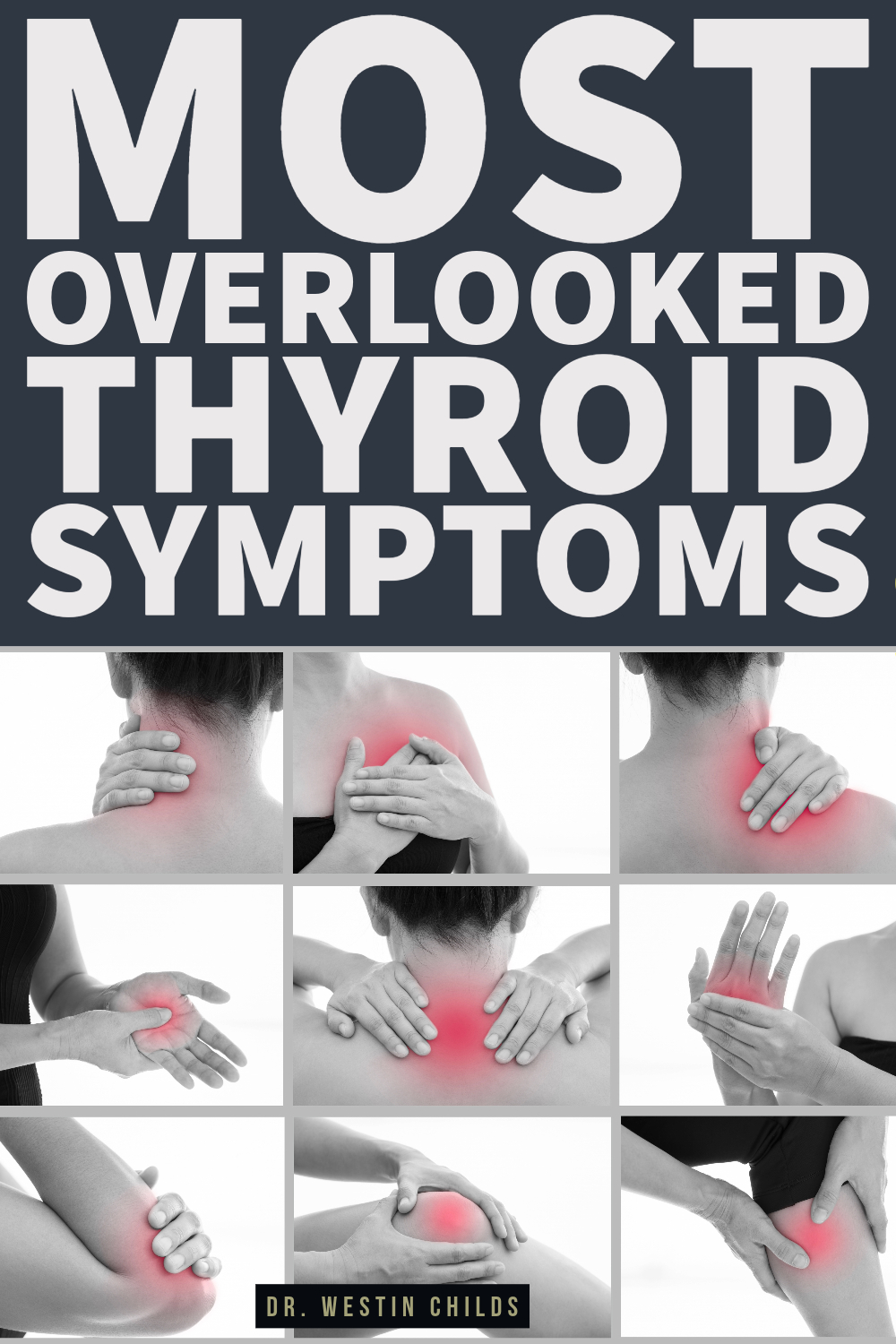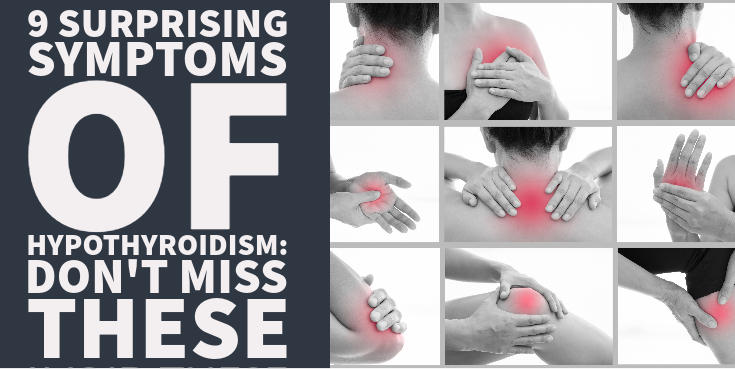Your thyroid is the single most important gland in your body because it plays a role in regulating all other hormones and systems.
It also happens to be incredibly sensitive to common problems like stress, nutritional deficiencies, and chemical exposure.
This is why thyroid problems are incredibly common, especially among women.
But you probably already know this.
I probably don’t need to tell you that thyroid issues cause problems like weight gain, fatigue, hair loss, and constipation.
While important, these symptoms are really just the tip of the iceberg.
Because just about every cell in your body has a thyroid hormone receptor, thyroid problems can cause issues in just about every single tissue and body part.
And what’s weird is that not everyone with a thyroid problem presents in the same way!
Yes, there will always be some overlap in things like fatigue and weight gain, which most thyroid patients experience, but there are plenty of other thyroid-related symptoms that can be missed if you don’t know what to look for.
Which is exactly why we are talking about both surprising and less well-known symptoms of hypothyroidism starting right now:
DOWNLOAD FREE RESOURCES
Foods to Avoid if you Have Thyroid Problems:
I’ve found that these 10 foods cause the most problems for thyroid patients. Learn which foods you should avoid if you have thyroid disease of any type.
The Complete List of Thyroid Lab tests:
The list includes optimal ranges, normal ranges, and the complete list of tests you need to diagnose and manage thyroid disease correctly!
#1. High Cholesterol
This one is both common and surprising, mostly because it’s not on the radar of doctors but it is definitely the case that your thyroid has a big impact on your cholesterol.
This is for two reasons:
The first is because it reduces the activity of an enzyme known as HMG-CoA reductase which is the same enzyme that statins target and is the rate-limiting step in the production of cholesterol.
Generally, if you reduce the activity of this enzyme then you’d expect to see cholesterol levels fall but that’s not what we see in hypothyroidism so what gives?
Well in addition to impacting this enzyme, the low thyroid state downregulates LDL receptor activity which means it slows down the clearance of LDL and HDL.
By reducing the clearance of these compounds, it allows them to build up in your system where you will eventually get flagged with high cholesterol.
And, just so we are clear, this is a big problem because along with this elevation in cholesterol, thyroid patients also see an increased risk of heart attacks and cardiovascular disease.
The good news is that treating your thyroid adequately will normalize your cholesterol and eliminate this risk entirely.
That is, of course, provided that you are also eating healthy and living a healthy lifestyle.
This also means that if you have an elevation in your cholesterol from some unknown cause then it may be a good idea to look into your thyroid as a potential cause.
And if you are a thyroid patient with an elevation in cholesterol already then this may be an indication that your thyroid function is not as optimized as it should be in which case you may need to adjust your thyroid medication to compensate.
#2. Menstrual Problems
In a study of over 50 hypothyroid women, only 22% had a normal cycle (1)!
This means that, to some degree, thyroid dysfunction impacts the menstrual cycle of almost 80% of women.
And when it does impact the menstrual cycle it can cause very long menstrual cycles (18%), heavy bleeding (40%), or the complete absence of the menstrual cycle (6%).
Why does this happen?
Well, it’s not exactly known why but what we do know is that thyroid hormone impacts sex hormone levels like progesterone and estrogen as well as gonadotropins like FSH which all play different roles in regulating the menstrual cycle.
When thyroid hormone level is low it lowers your FSH which in turn lowers drops your estrogen and progesterone.
And because estrogen and progesterone must be balanced in order for the menstrual cycle to progress normally, a relative drop in these hormones impacts the cycle.
This imbalance of progesterone to estrogen also favors symptoms like weight gain, menstrual irregularities, bloating, and infertility which are related to your sex hormones and not your thyroid.
The good news is that these problems tend to resolve quickly if they are related to your thyroid and you treat it.
The bad news is that women with these problems often need tighter control over their TSH level (2) compared to hypothyroid women who don’t have menstrual problems as one of their main symptoms.
#3. Swelling In The Legs (& In The Face)
When thyroid hormone levels are low, it causes a build-up of polysaccharides in the skin (3) in the form of glycosaminoglycans and hyaluronic acid.
These compounds happen to attract and store a lot of water.
Hyaluronic acid, for instance, can hold up to 1,000 times its weight in water (4) which is why it’s often used as a facial moisturizer.
This is great if you want to moisturize your skin, but not so great if your body starts to accumulate this compound where it shouldn’t.
These polysaccharides end up in tissues where they don’t belong and drag water along with them, resulting in swelling of the tissues.

This swelling can happen all over the body, by the way, it just so happens to be the most noticeable in the legs.
But you can definitely experience facial swelling, especially around the eyes with thyroid problems as well.
Because this problem isn’t related to your total body water, changing how much you drink will not have any effect.
If you want to fix this problem, you have to fix your thyroid.
#4. Headaches (And Migraines)
The connection between headaches and hypothyroidism is actually really interesting and completely different from what we’ve discussed so far.
For pretty much every symptom that we’ve discussed so far, low thyroid function is directly responsible for that symptom.
But headaches are much different.
Research suggests that the onset of new headaches may be an early predictor of a thyroid problem.
So instead of being a symptom of its presence, it’s more like a canary in the coal mine.
We know this because researchers have looked at people with new onset headaches and compared their incidence of hypothyroidism to controls and found a 20% increased risk above this rate (5).
What this means is that if you suddenly start developing headaches or migraines out of the blue, there’s a chance that these headaches may be a warning that hypothyroidism is about to develop in your body.
Now, realistically, it’s probably not the case that these headaches are some magical warning sign but, instead, just a very early symptom of thyroid disease.
Why it happens is not known but it’s probably related to the impact that thyroid hormone has on the muscles in your head and neck.
Low thyroid function can cause trigger points that can clamp down on the nerves and blood vessels that run to your head leading to tension headaches.
And, yes, this same information applies to migraines as well.
#5. Mood Swings
Thyroid hormone is responsible for revving up the metabolism and function of the entire body.
In states where thyroid hormone is low, energy production will suffer.
This applies to all tissues, including the brain.
Decreased energy production in the brain may contribute to sadness, depression, irritability, and mood swings that are typical among thyroid patients.
This is also probably why, by the way, thyroid patients end up with brain fog, slowed thought, and slowed speech as well.
It’s not like thyroid dysfunction halts all energy production in the brain, but it does appear to be the case that it slows it down enough to cause these symptoms.
If you are noticing that your moods are swinging wildly one way or the other, or if you just don’t feel like yourself, then it may be time to check on your thyroid.
#6. Dry Skin
Your skin is the biggest organ in your body and by virtue of its size, the site of a lot of thyroid hormone activity.
And a very common symptom associated with low thyroid function is that of dry skin.
This symptom stems from the impact that thyroid hormone has on the eccrine glands or sweat glands (6) found throughout your body.
Your sweat glands function primarily to regulate your body temperature but they also have an impact on lubricating the skin.
And because a sluggish thyroid decreases sweat gland activity, thyroid patients often end up with dry, itchy, scaly skin.
This is also why thyroid patients have to be careful about coming into contact with chemicals!
Their inability to sweat appropriately means that they have one less way to eliminate these compounds from their bodies which allows them to build up and cause problems over time.
#7. Muscle Aches And Pains
Having a thyroid problem also makes you more prone to developing muscle aches and pain and even chronic pain syndromes!
For instance, it’s been shown in research that the prevalence of fibromyalgia in the general population is 2-7% and as high as 30-40% in those with Hashimoto’s (7).
This is most likely due to the muscle issues that I mentioned previously when we talked about headaches.
When thyroid hormone is low, your muscles are unable to produce enough ATP which means they are unable to relax.
This lack of relaxation causes trigger points and tender points which result in chronic pain.
And you can identify these points by poking around on certain areas of your body.
#8. Changes To Your Voice
Your voice box is sensitive to many different hormones including your thyroid.
Do you remember when I mentioned that thyroid problems cause a build-up of polysaccharides in the tissues which drag water along with it?
Well, when it happens in the tissues in your legs it causes peripheral edema.
But as I mentioned there, it can happen anywhere, including in your vocal cords.
When it happens in your vocal cords you end up hoarseness and a loss of voice range (8).
This particular problem is not as common as the more subtle changes that most people with thyroid problems experience to the voice including changes to voice roughness, breathiness, and strain.
But you’re not likely to notice these more subtle changes, even though they happen to most thyroid patients unless you are a trained professional.
#9. Carpal Tunnel Syndrome
Polysaccharide deposition not only affects your voice, it can also affect your nerves.
When these compounds deposit themselves in the tissues around your wrist, you may end up with wrist swelling and the condition of carpal tunnel syndrome.
On top of this, hypothyroidism leads to weight gain which is yet another risk factor for carpal tunnel syndrome (9) so there are at least two different ways it can lead to this nerve problem.
If you have any of these symptoms then it would be a really good idea to check your thyroid.
But you should know that standard thyroid lab tests are not as accurate as you might think so if you want to accurately assess your thyroid, make sure you read this article next.
Now I want to hear from you:
Do you have any of these less well-known symptoms of hypothyroidism? If so, which ones?
Were you aware that thyroid hormone impacts just about every cell in your body?
Do you have any other lingering symptoms that you believe are associated with your thyroid condition?
Leave your questions or comments below!
Scientific References
#1. ncbi.nlm.nih.gov/pmc/articles/PMC7605301/
#2. ncbi.nlm.nih.gov/pmc/articles/PMC5800836/
#3. elsevier.es/en-revista-endocrinologia-nutricion-english-edition–412-articulo-skin-changes-associated-hypothyroidism-S2173509313001165
#4. ncbi.nlm.nih.gov/pmc/articles/PMC2778417/
#5. ncbi.nlm.nih.gov/pmc/articles/PMC3620300/
#6. ncbi.nlm.nih.gov/pmc/articles/PMC3219173/
#7. pubmed.ncbi.nlm.nih.gov/28176037/
#8. ncbi.nlm.nih.gov/pmc/articles/PMC6592446/
#9. ncbi.nlm.nih.gov/pmc/articles/PMC4800566/



Leave a Reply